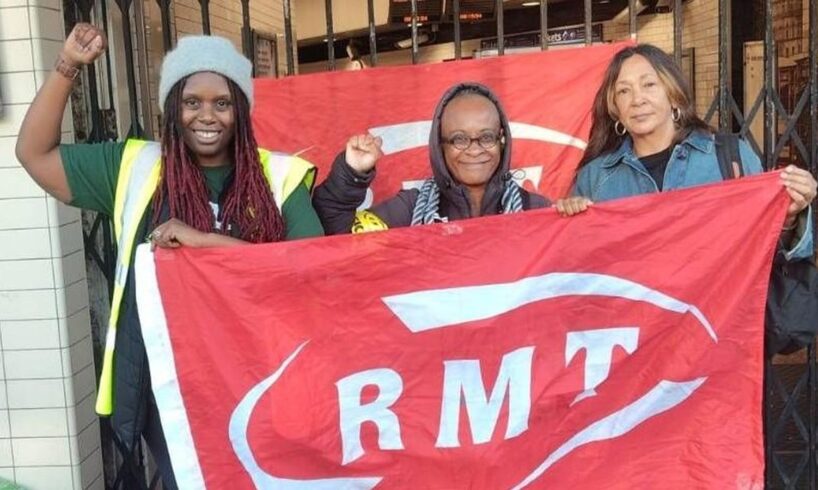
On November 4, the Rail, Maritime and Transport union (RMT) announced the end of the dispute on London Underground.
A press release boasted: “RMT secures three-year no-strings pay deal on London Underground.” The cursory statement nevertheless testifies to how the struggle launched by 10,000 London Underground workers to oppose a facto pay cut of 3.4 percent for 2025/6—with the RPI inflation rate at 4.5 percent—and against crippling, unsafe workloads has been sabotaged by RMT officials.
The RMT’s attempt to present the settlement ending the dispute as achieving the aims London Underground train drivers, engineers, signalling and station staff were fighting for is based on distortions and evasions over the central demands for a pay rise and a shorter working week.
RMT General Secretary Eddie Dempsey claims, “This deal is a clear demonstration of the effectiveness of strike action and strong negotiations by our members.” In fact, the RMT executive received a 96 percent strike mandate, but after the initial strike from September 5–12—taken alongside RMT members on Docklands Light Railway opposing a similar derisory offer of 3.4 percent—all further action was halted.
Eddie Dempsey speaking at the demonstration against the Gaza genocide in London, September 7, 2024
Closed-door talks followed between Dempsey and RMT negotiators and London Underground (LU) and Transport for London (TfL) bosses. Workers had no oversight, while Dempsey declared the 3.4 percent uplift already rejected through strike action was the basis for settlement in a September 29 press release. The World Socialist Web Site reported on workers pushing back against the “improved offer” after it was repackaged as a three-year deal with years two and three pegged to RPI inflation which they slammed as a “terrible deal” and “no improvement whatever”.
This ploy to nullify opposition to another real-terms pay cut for this year was combined with dropping the demand to reduce the working week from 35 to 32 hours—a central issue for combating fatigue from extreme shifts. Underground staff already work beyond scheduled hours due to severe understaffing following thousands of job cuts.
The September 29 RMT release stated the executive would meet reps over the proposals. Members were only told to contact reps with their “views”, rather than holding workplace meetings where workers could scrutinise the proposals together and come to a collective position. The final announcement ending the dispute makes no reference to a membership ballot to endorse the deal.
The bureaucratic exercise ensured the dispute and its outcome were kept out of the hands of the rank and file by the “members-led union.” Like every other union bureaucracy, the RMT leadership—posturing as “left” and militant—functions as an apparatus to manufacture consent for sellout deals cooked up in private with management.
The WSWS requested further information on the deal from the RMT but has not received a reply. What is in the press release is damning.
Fact versus spin Pay: In a sleight of hand, Year 1’s 3.4 percent is described as “equivalent to February 2025 RPI , but the award is backdated to April and RPI has been consistently over 4 percent since then. The following years are at best pay stagnation: Year 2—RPI at February 2026, effective April 2026, with a minimum 3 percent; Year 3—RPI at February 2027 + 0.2 percent, effective April 2027, with a minimum 2.5 percent.Shorter working week: There is no reference to reducing the working week from 35 to 32 hours—a core strike demand. Instead, the press release refers vaguely to “commitments addressing work-life balance… including ‘fatigue-friendly’ rosters.” Similar evasive language is applied elsewhere on unresolved issues: “further discussions on staff travel, and a consistent Boxing Day payment of £400.” Dempsey had stated that existing shift patterns cut life expectancy by up to ten years, yet the deal substitutes concrete measures to prevent workers premature deaths with empty “commitments.”No strings: Dempsey claims the deal “departs from the recent industry approach of linking pay to flawed productivity.” But he had already accepted TfL’s cost cutting framework with productivity increases telling BBC Politics Live, “We’ve helped to deliver a £166 million surplus in London Underground. We’ve got ridership up to record levels, and we are doing that with 2,000 fewer staff than we were before the pandemic.” If these are not strings, then what is?
The way forward
Ending the dispute on these miserable terms underscores the need for London Underground workers to establish a rank-and-file committee to take direct ownership of their struggle. Such a committee can organise a link up with other transport workers to wage an industrial and political fightback against the Starmer government’s pro-business and austerity driven agenda.
The deal is designed to ensure no strikes over pay and conditions for the next 2 and a half years, with the Financial Times stating, “The agreement announced on Tuesday banishes the prospect of future strikes”. Dempsey has bound the hands of workers based on a miserly pay award, empty promises on tackling fatigue and ditching the shorter working week.
These issues will reassert themselves with full force amid continued understaffing of stations and the safety risk posed to workers and the public. The central issue is to take this struggle forward through workplace organisation at depot and station level, independent of the union apparatus.
At the centre of Dempsey’s surrender document is the political damage exercise he undertook on behalf of Labour Mayor of London Sadiq Khan, who oversees TfL’s pro-market business model for the Starmer government. This includes maintaining the withdrawal of the central government grant brought in by the Tories, with day to day running costs mainly funded by passenger revenue with the most expensive fares for a capital metro system in the world.
As WSWS coverage from the picket lines showed, London Underground workers were ready to fight not accommodate. They spoke of reaching breaking point with cuts and unsafe workloads, demanding a properly funded transport system financed by ending the tax giveaways to big business. Workers also opposed Labour’s anti-immigrant witch hunt and defended colleagues facing deportation under new visa rules, stressing the need for class unity in a fight against the corporate oligarchy—the real drain on society.
Pickets out at London Kings Cross-St Pancras
Dempsey’s sell out is matched by that of another left talker, Unite’s General Secretary Sharon Graham in the demobilisation of the strike on Greater Manchester buses which developed in parallel with the walkouts on London Underground in September. This was also to defuse a confrontation against another Labour Mayor, Andy Burnham, who oversees Transport for Greater Manchester’s “Bee Network”.
After the first strike involving more than 2,000 drivers at Stagecoach, Metroline and First Bus, backroom meetings were organised by Burnham with Unite officials and bus executives to put revised offers ensuring substandard agreements were rammed through based on breaking down the unified resistance. The two-year deals also excluded any resolution of outstanding working conditions: extended times behind the wheel, insufficient break time and lack of toilet facilities.
This was all to maintain the Labour authority’s single franchising network with the private operators under the Bee Network, which is has nothing to do with genuine public control.
The problem is not a lack of fight by transport workers, but the need to unshackle this resistance from the union bureaucracy whose watchword is “partnership” with the Starmer government and its local representatives, not opposition. Labour’s right-wing lurch is mirrored in the trade union bureaucracy, which snuffs out any spark of anti-capitalist sentiment to police the class struggle and uses its command of an apparatus to ride roughshod over the rank-and-file.
To begin the organisation of a fightback, we encourage London Underground workers to write in to the WSWS on the RMT’s deal and give the viewpoint from the shopfloor rather than the spin from the union’s PR department.
Make your voice heard! Tell us what your working conditions are like and what you are fighting for. We will protect your anonymity.





